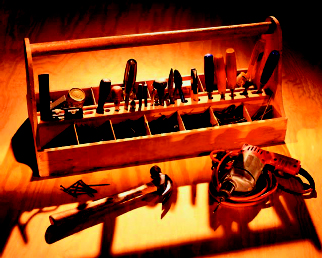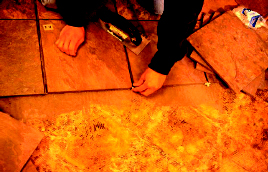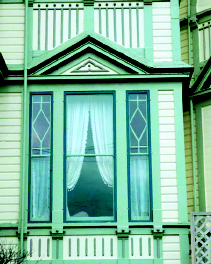Sometimes it’s pointing, sometimes it’s plumbing. And, if you’re lucky, sometimes it’s simply peeling paint.
Sooner or later, we old home owners will be faced with a restoration or renovation project, varying in scale or degree.
 In all likelihood, the decision is whether or not to have the work done by a hired professional. If you decide to consult and engage the services of a licensed specialist, then you must (1) discover where and how to find these skilled workers and (2) how to decide among them. These and more questions may arise, when perhaps it’s only an old claw foot bath tub, or a splintering hard wood kitchen floor, or a loosening twelve-over-twelve bedroom window, that needs repairing.
In all likelihood, the decision is whether or not to have the work done by a hired professional. If you decide to consult and engage the services of a licensed specialist, then you must (1) discover where and how to find these skilled workers and (2) how to decide among them. These and more questions may arise, when perhaps it’s only an old claw foot bath tub, or a splintering hard wood kitchen floor, or a loosening twelve-over-twelve bedroom window, that needs repairing.
Let’s start with the do-it-yourself approach. Now, the “anyone-can-do-that,” and the “you-can-just-do-that-yourself” that you may elicit from your friends or neighbors or family members are not always well thought out pieces of advice. Why? Some of the folks who find themselves in aged and aging structures cannot and should not attempt to re-glaze a single window pane, or repair a piece of door hardware, or sand a small section of flooring. And, while these owners of old homes are few and far between—especially among the population already dwelling in antique homes— the point here is to be wary of others who have no idea what your potential (albeit, latent) might be. In other words, trust yourself and know your limits. If you’ve never before attempted a miter cut, it’s probably best to get some assistance with the crown molding you’re about to restore.
 If you do happen to be handy, though, and want to do some or all of the work on your antique home yourself, you must also be true to yourself and to your home—which means this: Do not bite off more than you can chew. Having previously done the project a dozen times that you are now faced with is one thing. Attempting something completely new because it seems easy enough is quite another. Now, of course there are projects that first-timers can handle, and there are even a few first-timers that can handle just about any project. But, you should really know what you’re getting into, even if you’ve never been “in there” before.
If you do happen to be handy, though, and want to do some or all of the work on your antique home yourself, you must also be true to yourself and to your home—which means this: Do not bite off more than you can chew. Having previously done the project a dozen times that you are now faced with is one thing. Attempting something completely new because it seems easy enough is quite another. Now, of course there are projects that first-timers can handle, and there are even a few first-timers that can handle just about any project. But, you should really know what you’re getting into, even if you’ve never been “in there” before.
Underneath the horse hair plaster that you are considering taking down yourself, for instance, are many potential hidden disasters. You may find rotted posts, insect damage, a water problem, or even some form of buried treasure. A rule of thumb with these things might read thus: Prepare yourself for the worst and hope to be pleasantly surprised. In your preparations, however, try to foresee many of the potential issues and have contingency plans lined up just in case. It’s always better to be over prepared rather than ill prepared.
If you are leaning toward trying something new to you, or if finances necessitate this, take solace in knowing that you need not be completely on your own. There are countless books, DVDs, instructional shows, and websites out there to help in your efforts. Indeed, the This Old Homes of the world have multiplied over the past several years, serving antique home owners via many different formats and venues. In addition to these commercial sources, though, are numerous slightly less conventional means by which you can gain access to networks, receive assistance or seek advice.
 One place to go for help that you may not have considered is your local or regional historical society. Historical society memberships are often made up of people who (disproportionately to the rest of society) live in antique homes. And, as one’s membership in an historical society suggests a concern for history and historic preservation, members are usually willing to advise or assist others in their efforts to restore, repair, and preserve. Many historical societies, though not all, offer this type of advice to the local community on matters of restoration. And, more times than not, if they do not offer direct advice/consulting, they have lists available of those who might.
One place to go for help that you may not have considered is your local or regional historical society. Historical society memberships are often made up of people who (disproportionately to the rest of society) live in antique homes. And, as one’s membership in an historical society suggests a concern for history and historic preservation, members are usually willing to advise or assist others in their efforts to restore, repair, and preserve. Many historical societies, though not all, offer this type of advice to the local community on matters of restoration. And, more times than not, if they do not offer direct advice/consulting, they have lists available of those who might.
Such a list in Boston’s Metrowest would undoubtedly include the Old House Association. The Old House Association membership consists of antique home enthusiasts (mostly, but not exclusively, owners of antique homes) who meet monthly to tour a selected member’s home and then proceed to discuss common issues, and projects as well as solutions to, suggestions for, and advice on. This group and others like it can be an invaluable resource in any homeowner restoration project. And, additionally, these networking groups are great for just that—networking.
While networking is a good tool for do-it-yourselfers, it is an even better one for those with no interest in brandishing a hacksaw. For, when push comes to shove, and you are just not able to restore for yourself, whether it be due to lack of time, skill or confidence, knowing you can rely on the hired professional is imperative. It can be discomforting enough having a relative stranger in your home and much more so if you also have to worry about whether or not they will do a proper job, with the right sensitivity toward your antique home. So, groups like the Old House Association, as well as other bodies (your local Historical Commission or Historical Society, for instance) are perfect for bouncing ideas off others to see what comes back. Chances are, among the membership of such a group there will be at least three or four antique home owners who have gone through the exact type of project you are about to undertake. And, when you find these people, pick their brains on who they used, how happy they were with the work and rates, and whether or not they’d recommend the services to you.
If you encounter difficulties in locating these types of networking groups in your area, (often in winter months the meetings are scaled back) and you’re desperate enough to go it alone when choosing a professional, this list may help. First, look for language in advertisements or flyers put out by the company or worker that specifically refers to experience or, better yet, expertise in older or antique homes. It is always better to hire someone who has already experienced some potential “unknowns” before starting a restoration project. Second, try to find a professional who will come to your house and give you an estimate at no cost. Though this is pretty standard stuff, there are companies out there who make a business of charging for estimates (or who use the not-for-free estimate as a way to screen potential customers) Lastly, rely on your gut when talking or meeting with a potential hired hand or specialist. Chances are if you don’t feel like you’re “clicking” early on there’ll be big trouble on down the road—when it may be too late. After all, as the owner of your antique home, nobody knows better than you the type of person that you seek for this proper repair and care.
Richard Wilcox is an old house aficionado and real estate professional specializing in antique and older homes.



